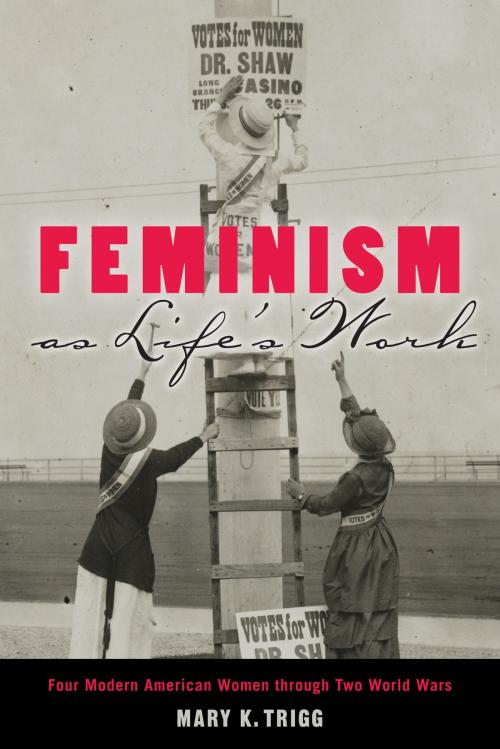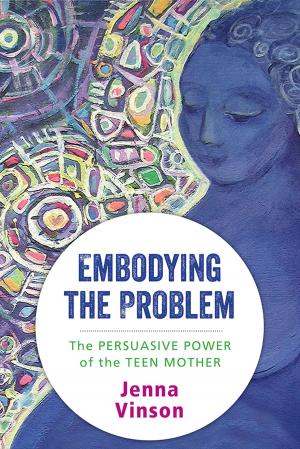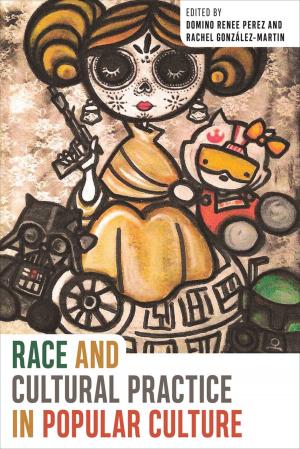Feminism as Life's Work
Four Modern American Women through Two World Wars
Nonfiction, Social & Cultural Studies, Social Science, Gender Studies, Women&, History, Americas, United States, 20th Century| Author: | Mary K. Trigg | ISBN: | 9780813573144 |
| Publisher: | Rutgers University Press | Publication: | June 23, 2014 |
| Imprint: | Rutgers University Press | Language: | English |
| Author: | Mary K. Trigg |
| ISBN: | 9780813573144 |
| Publisher: | Rutgers University Press |
| Publication: | June 23, 2014 |
| Imprint: | Rutgers University Press |
| Language: | English |
With suffrage secured in 1920, feminists faced the challenge of how to keep their momentum going. As the center of the movement shrank, a small, self-appointed vanguard of “modern” women carried the cause forward in life and work. Feminism as Life’s Work profiles four of these women: the author Inez Haynes Irwin, the historian Mary Ritter Beard, the activist Doris Stevens, and Lorine Pruette, a psychologist. Their life-stories, told here in full for the first time, embody the changes of the first four decades of the twentieth century—and complicate what we know of the period.
Through these women’s intertwined stories, Mary Trigg traces the changing nature of the women’s movement across turbulent decades rent by world war, revolution, global depression, and the rise of fascism. Criticizing the standard division of feminist activism as a series of historical waves, Trigg exposes how Irwin, Beard, Stevens, and Pruette helped push the U.S. feminist movement to victory and continued to propel it forward from the 1920s to the 1960s, decades not included in the “wave” model. At a time widely viewed as the “doldrums” of feminism, the women in this book were in fact taking the cause to new sites: the National Women’s Party; sexuality and relations with men; marriage; and work and financial independence. In their utopian efforts to reshape work, sexual relations, and marriage, modern feminists ran headlong into the harsh realities of male power, the sexual double standard, the demands of motherhood, and gendered social structures.
In Feminism as Life’s Work, Irwin, Beard, Stevens, and Pruette emerge as the heirs of the suffrage movement, guardians of a long feminist tradition, and catalysts of the belief in equality and difference. Theirs is a story of courage, application, and perseverance—a story that revisits the “bleak and lonely years” of the U.S. women’s movement and emerges with a fresh perspective of the history of this pivotal era.
With suffrage secured in 1920, feminists faced the challenge of how to keep their momentum going. As the center of the movement shrank, a small, self-appointed vanguard of “modern” women carried the cause forward in life and work. Feminism as Life’s Work profiles four of these women: the author Inez Haynes Irwin, the historian Mary Ritter Beard, the activist Doris Stevens, and Lorine Pruette, a psychologist. Their life-stories, told here in full for the first time, embody the changes of the first four decades of the twentieth century—and complicate what we know of the period.
Through these women’s intertwined stories, Mary Trigg traces the changing nature of the women’s movement across turbulent decades rent by world war, revolution, global depression, and the rise of fascism. Criticizing the standard division of feminist activism as a series of historical waves, Trigg exposes how Irwin, Beard, Stevens, and Pruette helped push the U.S. feminist movement to victory and continued to propel it forward from the 1920s to the 1960s, decades not included in the “wave” model. At a time widely viewed as the “doldrums” of feminism, the women in this book were in fact taking the cause to new sites: the National Women’s Party; sexuality and relations with men; marriage; and work and financial independence. In their utopian efforts to reshape work, sexual relations, and marriage, modern feminists ran headlong into the harsh realities of male power, the sexual double standard, the demands of motherhood, and gendered social structures.
In Feminism as Life’s Work, Irwin, Beard, Stevens, and Pruette emerge as the heirs of the suffrage movement, guardians of a long feminist tradition, and catalysts of the belief in equality and difference. Theirs is a story of courage, application, and perseverance—a story that revisits the “bleak and lonely years” of the U.S. women’s movement and emerges with a fresh perspective of the history of this pivotal era.















